 Peter Verwer of the Property Council of Australia is publicising a 'campaign' to convince politicians that Australians want a bigger population and cities. It's called "www.makemycitywork." The spin is that the only problem the public perceive with big cities is that the infrastructure hasn't kept up with demand. So the Property Council and its business allies plan to fix that, don't they. The content is thin but it's all part of a blitz on the public from the Growth Lobby, along with Bernard Salt's plans for astroturfing public support for population growth and big business, Elizabeth Prosser's push to abolish local councils in Victoria, Mary Massina's lobbying for council amalgamation in Tasmania... It's yet another relentless campaign by big business to further reduce Australia to a mine and real-estate economy for their own benefit and it requires getting rid of more of Australians' democratic rights, along with anything natural and free that gets in its way.
Peter Verwer of the Property Council of Australia is publicising a 'campaign' to convince politicians that Australians want a bigger population and cities. It's called "www.makemycitywork." The spin is that the only problem the public perceive with big cities is that the infrastructure hasn't kept up with demand. So the Property Council and its business allies plan to fix that, don't they. The content is thin but it's all part of a blitz on the public from the Growth Lobby, along with Bernard Salt's plans for astroturfing public support for population growth and big business, Elizabeth Prosser's push to abolish local councils in Victoria, Mary Massina's lobbying for council amalgamation in Tasmania... It's yet another relentless campaign by big business to further reduce Australia to a mine and real-estate economy for their own benefit and it requires getting rid of more of Australians' democratic rights, along with anything natural and free that gets in its way.


Peter Verwer, CEO of the Property Council of Australia, is launching another PCA campaign to counter citizen resistance to the impacts of unwanted population growth in their cities. It's called, "Make My City Work". He's sending round invitations purporting to be inviting the community to join in and tell the Property Council of Australia what us citizens want to make our overpopulated and congested cities better. He even exhorts us to "stand-up for our cities by signing-up for action today [with the property council's campaign]."
We abolished slavery - now why not growthism?
It's a bit like having a group of plantation owners start up a campaign asking the slaves to stop back for a pow-wow to help iron-out a few wrinkles in the slave-trade so that we can all get some kind of win-win solution.
Nothing about stopping slaving, you understand - or, in this case - stopping the continuous lobbying for population growth that has got us into this mess.
But, here's the thing: None of us slaves - sorry - citizens were ever asked to vote on this and, according to the latest polls, 78% of us want it to stop. Those of us who have looked into the matter realise that Australian state governments could radically slow down population growth by ceasing to advertise for immigrants over the internet.
A small section of the community, however, cannot wean itself off obscene profits at the expense of the rest who do not profit from population growth.
"Growth is inevitable," Mr Verwer asserts in a creepy on-line current affairs tv simulation, 3Q.[1]
If Peter Verwer is in the business of lobbying for more property development and the population growth that causes demand for more development, how can he logically put himself across as some kind of community activist, sincerely asking for peoples' opinions, whilst promulgating the doomsday scenario of Growth is Inevitable?
Check out the Property Council 2010 campaign and see the naked agenda for yourself.
Yet that is what this website he is representing claims to be doing with constant references to 'we'.
Verwer even acknowledges that "People are being honest. They feel stressed out and frustrated. They want to get around much easier and have access to community services ... but [he adds] people also recognise that growth is inevitable."
He then continues, somewhat incoherently: "Their view is that - they are a bit negative - they want to show some leadership, but they want to be part of developing a plan for the future of cities, not just now, but for their kids as well."
3Q Tasteless Corporate Whimsey
3Q program presenter, Sarah MacDonald's approach to the subject seems fatuous when you consider the growing hardships and gradual exclusion that overpopulation is visiting on Australians.
MacDonald claims (using words from the Property Council campaign) that Australians
"love to moan about the traffic, the cost of housing, and the long queues, for everything, from child-care places to aged-care facilities..."
Then she says (addressing Verwer): "Peter, we do like to complain, but are we complaining about the right things?"
This is Verwer's queue to say how "we" all understand that growth is inevitable and to imply that we want to have some leadership on how to cope with it.
I would suggest that the right questions are: How is this catastrophe, which the property lobby caused, affecting our right to self-government, our rights as citizens, the medium-term survival of individuals and entire communities, along with the things they worked for and the environment that nurtured them?
3 Q's MacDonald, addressing Verwer as if he were the oracle, asks why our cities are so unable to cope with what is happening and how we got there.
Verwer simply replies that it's because of a failure of long-term planning.
[Well, I don't know. The Property Council has been planning this for a long time as far as I can see.]
Verwer does not say that our cities are unable to 'cope' because our governments and business sponsors have been importing enormous numbers of people to this country.
And he fails to say that his Property Council of Australia, its member organisations, and other growth-lobby 'peak bodies' present and past, such as APop, the Housing Industry of Australia, and The Real Estate Institute of Australia, are largely to blame for our predicament.
It's still Us and Them
So, when the Property Council blog, "Make my City Work," uses the term 'We', I think they should state that they derive focused benefits from the population growth that costs 'us' so much pain, hardship and money. I think they should admit to the way they benefit from what is more generally destroying democratic freedom, eating up green spaces, wild places, natural surroundings, much loved wildlife, creating uncertainty, using up vital resources, inflating the price of water, power and petroleum, and causing our universities to be filled with foreign students instead of Australian citizens.
[See the Property Council 2010 campaign for some insight into this organisation.]
Why would 'we' trust Verwer and his organisation to advance 'our' interests?
In very similar words to the 3Q interviewer's leading questions, Verwer promotes the following message:
"If you believe it’s time for politicians to get serious about our cities, please click on www.makemycitywork.org.au, and sign-up for action.
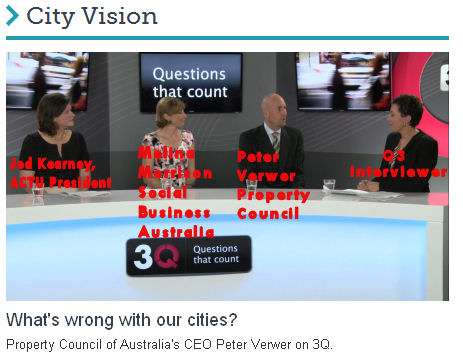
In " - Your Invitation to Join the Campaign," Verwer piles it on:
"Australians love their cities, but are also frustrated by them. We curse transport congestion and delays, low housing affordability, and long waiting lists for vital community services such as child and aged care places or hospital beds. Above all, we condemn the absence of long-term vision and bold thinking about cities. Across the country, there is a growing feeling that our cities just don’t work as well as they should. The Property Council is launching a national campaign to mobilise the political will to forge a better deal for our cities. To do this we first need to muster public support to prove there is a powerful mandate for action."
Of course there is a powerful mandate for action, but that action, if truly democratic, would not be to the Property Council's advantage. The purpose of this 'appeal' is to get people thinking that the Property Council will act in their interests and to get them to solicit the government to listen to the Property Council.
It all looks like plain old astroturfing, bankrolled by an incredibly rich lobby, which has the National Press Club in its pocket. Not a suggestion that it can buy the National Press, but that it can buy their time and coverage with this phoney campaign.
"Our campaign – Make My City Work – will be launched at a televised address on 28 March at the National Press Club in Canberra.
We invite you and your colleagues to support this campaign by:
1. Signing up as a campaign supporter.
2. Encouraging your friends and colleagues to do the same.
3. Making your voice heard by participating in campaign activities.
It takes only moments to sign-up – simply visit www.makemycitywork.org.au.
By doing so, you show politicians and policy makers that cities are critically important and that you want action.
You will hear much more about this campaign in the coming weeks and months.
Please stand-up for our cities by signing-up for action today."
[Signed]
Peter Verwer
Chief Executive
Property Council of Australia
[email protected]"
NIMBY'S are the people who will save our cities and the country
I would suggest that the organisations we can trust and which we can work with are Sustainable Population Activists Australia, who write many of the counter-growth lobby articles on candobetter.net. and are also networked with individuals all over Australia, including Planning Backlash, Protectors of Public Lands, the more active S.O.S. groups, and a myriad of courageous suburban and country groups, rescuing wildlife and defending their habitat, campaigning for water as a public resource, educating their peers on the merits of relocalisation and local control over food production - in short, all the NIMBYs who stand up to defend what is ours and raise the alarm when massive corporations and their lobby groups with the cooperation of parliaments, try to take more from us. NIMBY'S are just citizens and NIMBY'ism is just an epithet for democracy these days by those who hold it in contempt.
Danger of Astroturfers
Of course, if this Property Council campaign succeeds in confusing Australians to actually sign up in any numbers or the organisers actually manage to make it look as if they have mobilised some people outside their own paid-up membership, there is a risk that they can then use this to give themselves some pseudo-legitimacy as community representatives. This is a dangerous phenomenon and needs to be exposed. If it is not widely exposed, then government and the media will simply continue to collude with the interests of groups like the Property Council of Australia in forcing a huge population on Australia and causing increasing misery for Australians.
Property Council's public message is misleading
The glossing over responsibility and cause and effect are breathtaking on this site:
"We know our cities are growing and society is changing. We need to hand a higher quality of life to the next generation."
The blurb under "Sustainability" on the site is completely misleading:
"A vision for a greener future."
This is a vision for megacities that will take more from rural areas. How can that be 'greener'?
"Our cities can help us save the planet."
Uh ... what?
"Our cities can use energy more wisely, emit less pollution, suffer less congestion and do more to harness the sun and recycle water."
These claims have no measurable contexts. What is obvious is that as Australia's population grows so does its carbon footprint and fossil-fuel use and export.
"To do this we need a more creative approach to removing barriers, incentivising industry, smart planning and investing in the infrastructure we need."
See Tim Murray on "Smart Growth."
Nightmare visions for every state on this Property Council Blog
There is a page for every state.
And a nightmare 'vision' for each one too.
The writing is disturbingly coercive: Melbourne will grow to be Australia's biggest city. There will be 6 million there by 2030 etc.
Each state has similar dire predictions which the Property Council is hell-bent on facilitating.
Vervos says that the reason that cities are so big is that they are a magnet.
He does not admit that people go to cities because the economic structure has almost destroyed any economic alternative.
Nor does he mention that most immigrants go to cities and that immigration now accounts for over half of Australia's annual population growth. Immigration now outweighs births in Australia, even though the birth rate has climbed slightly over the past decade. Even though Australia's population would continue to grow for decades more even if immigration ceased from tomorrow.
At http://ournation.propertyoz.com.au/ the authors present a model about how they hope Australia's population will grow, with the following proviso:
"This model has been prepared in accordance with the requirements of Property Council of Australia. The services provided in connection with this engagement comprise an advisory engagement which is not subject to Australian Auditing Standards or Australian Standards on Review or Assurance Engagements, and consequently no opinions or conclusions intended to convey assurance have been expressed.
No warranty of completeness, accuracy or reliability is given in relation to the statements and representations made by the Allen Consulting Group.
[...]
This model has been prepared at the request of the Property Council of Australia.
Other than our responsibility to the Property Council of Australia, neither the Allen Consulting Group nor any member or employee of the Allen Consulting Group undertakes responsibility arising in any way from reliance placed by a third party on this model. Any reliance placed is that party’s sole responsibility.
Look out Tasmania!
Although this so-called "Makemycitywork" blog has different portals for every Australian capital city, this article cannot deal with them all, so I have chosen to look at how it treats Tasmania.
We recently heard from Tigerquoll of how an entire suburb full of Koreans is to be inserted into the Tasmanian electorate without so much as asking the community's permission. So we know that Tasmania is in the sights of the growth lobby. And we also know that Bernard Salt was recently campaigning for growthists to start spreading their propaganda via the social media, in order to get an apparently authentic trend happening to counter grass-roots counter-growth lobby which came into being to help ordinary people identify the agents of unwanted and unnecessary growth and organise to stop being snowed by them.
We see many of these propaganda trends in newspaper articles which just happen to feature property council views again and again, and in a kind of parallel tv universe creation in the form of the current-affairs format panel interview called 3Q, on "Essential Vison", where, Peter Verver is presented as a bland kind of socially motivated 'expert' pushing the idea of cities. "What's wrong with our cities? [Read more about 3Q.[1]]
Council Merger push by corporates
The nightmare for Tasmania includes, "Council Merger Kick-along: Property Council of Australia executive director Mary Massina has demanded action on local government reform, as an independent report recommending council amalgamations sits gathering dust in mayoral offices."
For those of you who have already suffered, since Jeff Kennett in Melbourne, and Anna Bligh in Brisbane, from council amalgamations, here are the vested interests that drive them, which are totally anti-democratic. On 21 March Australian banker, Elizabeth Proust, pushed a line that Australians should be denied their local councils because they were more easily able to stand up against property development and overpopulation. She used the term 'NIMBY' as a derogation.
In Charles Waterhouse, "Council Merger Kickalong,", The Mercury, March 03, 2012 12.00, the journalist has created a 669 word article, citing a number of professionals praising council amalgamations, suggesting that there is a general swing towards these among ordinary Tasmanians in the first 593 words. Right at the bottom (and how many readers would continue down that far, he apportions 76 words to another side to the propaganda [the real community] allowing that:
"However, some residents are worried for their communities and question the benefits.
Citizens for Glenorchy leader Jan Dunsby said no business case study had proven cost savings from forming a greater Hobart council.
"How can we form an opinion when there is nothing to back up any cost savings?" she said.
"Other councils which have amalgamated on the mainland have not produced cost savings and if rates have diminished, so have services you can't have both.""
Another article, by Craig Hogget, "Council merger risk warning," September 28, 2011, which gives a bit more weight to those who are not taken in by council mergers, nonetheless uses biased language. Mergers are dubbed 'reforms', as in "Council mergers have been increasingly on the agenda since the Southern Tasmanian Councils Authority set up an independent review into the issue. The Property Council of Tasmania has also been campaigning for local government reform."
In another article by Craig Hoggett, "Bold Bid ends in farce," September 28, 2011, about local council elections, we can read of how Liberal Party member, Mr Bold, had been campaigning for months on a platform of reducing red tape [euphemism for pro-council amalgamations], but missed the deadline for election candidates. Mr Bold is in the construction business with a company, "Bold Impressions," which "creates 3D computer models of construction projects."
Yet another article in the Mercury, by David Killick, "Planning rated as a failure," March 16, 2012, begins with the ubiquitous Property Council of Australia again, "TASMANIA'S planning system has been rated the worst in the nation by the Property Council of Australia." Much of the rest of the article gives prominence to Property Council state director Mary Massina.
You get the picture, I hope. And let's all hope that it never comes to pass, for the outrageous growth that the Property Council seeks so remorselessly is not inevitable, but they would have it so.
It may seem impossible to stop growth, but stopping slavery was also considered impossible not so very long ago.
NOTES
"Essential Vison", where 3Q is presented, lists some strange assortment of bedfellows as its 'partners': "Industry Super Network, Every Australian Counts campaign, Australian Manufacturing Workers Union, Australian Super, Greenpeace, Community and Public Sector Union, bankmecu, Property Council of Australia, CFMEU."
 And here is a report from citizens taking control in East Preston: On 1st April 2012 our East Preston day started with one of the principals of LOVE Real Estate knocking on the door and saying that if we mention the name of LOVE Real Estate in our protest they will sue! I said "Really? promise? hey bring it on - we need all the publicity we can get!". An hour later, we photographed them photographing us!
And here is a report from citizens taking control in East Preston: On 1st April 2012 our East Preston day started with one of the principals of LOVE Real Estate knocking on the door and saying that if we mention the name of LOVE Real Estate in our protest they will sue! I said "Really? promise? hey bring it on - we need all the publicity we can get!". An hour later, we photographed them photographing us!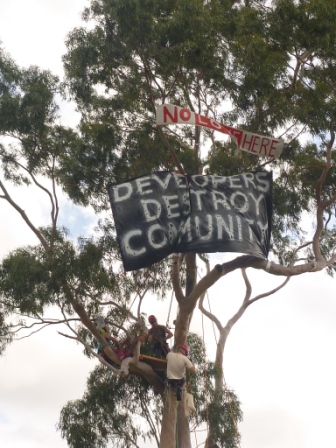



 These images were dreampt up in the night when artist activist James Paterson of Boronia could not sleep being so worried about what is being done by developers in his area. Apparently he got up and made these images to warn the world and galvanise Boronians.
These images were dreampt up in the night when artist activist James Paterson of Boronia could not sleep being so worried about what is being done by developers in his area. Apparently he got up and made these images to warn the world and galvanise Boronians. 



 We are all here for a limited time, but when we have to work harder and harder to stay in one place, that is not really living. Who is stealing our time? Were it not for the cost of housing, Australians would need to work only half the hours they have to and manufacturers would halve their costs! We have only to consider how, in two generations, Australians have gone from needing one income to purchase a house to a situation where both spouses must work and pay for others to bring up any children they may find a brief instant to produce. The writer reviews two works on time-poverty: one a heavyweight and the other a lightweight and remarks that time is money. Time is life. See the film or watch the trailer; feel the truth: spot the enemy.
We are all here for a limited time, but when we have to work harder and harder to stay in one place, that is not really living. Who is stealing our time? Were it not for the cost of housing, Australians would need to work only half the hours they have to and manufacturers would halve their costs! We have only to consider how, in two generations, Australians have gone from needing one income to purchase a house to a situation where both spouses must work and pay for others to bring up any children they may find a brief instant to produce. The writer reviews two works on time-poverty: one a heavyweight and the other a lightweight and remarks that time is money. Time is life. See the film or watch the trailer; feel the truth: spot the enemy. The period since the Murray-Darling Basin Authority released its guide to the proposed plan, nearly two years ago, has been marked by sustained outrage from all quarters.
The period since the Murray-Darling Basin Authority released its guide to the proposed plan, nearly two years ago, has been marked by sustained outrage from all quarters. 

 What you won’t hear from Labor or Liberal spokespeople about the causes of the Queensland election result.
What you won’t hear from Labor or Liberal spokespeople about the causes of the Queensland election result.
 Humanity has struggled to survive through the millennia in terms of balancing population size with food supply. The same is true now, but population numbers have been soaring for over a century. The limiting factor has been hidden, but this factor -- oil and natural gas, or petroleum -- is close to or beyond its peak extraction. Without ample, free-flowing petroleum, it will not be possible to support a population of several billion for long.
Humanity has struggled to survive through the millennia in terms of balancing population size with food supply. The same is true now, but population numbers have been soaring for over a century. The limiting factor has been hidden, but this factor -- oil and natural gas, or petroleum -- is close to or beyond its peak extraction. Without ample, free-flowing petroleum, it will not be possible to support a population of several billion for long.
 Sustainable Population Australia is pleased to announce the auction of the 4 piece art work “Encroachment” by noted Kimberley artist and SPA member Jackie Ellis.
Sustainable Population Australia is pleased to announce the auction of the 4 piece art work “Encroachment” by noted Kimberley artist and SPA member Jackie Ellis.
 Ratepayers have fewer and fewer rights in Victoria but it may be that they can refuse to pay their rates unless they are satisfied.
Ratepayers have fewer and fewer rights in Victoria but it may be that they can refuse to pay their rates unless they are satisfied.
 Letter from Australian Wildlife Protection Council to RSPCA: "We seek your help to insist that appropriate action be taken against the perpetrators of cruelty committed vs a Fraser Island Dingo. Freedom of Information reveals Dingo Necropsy Report of a cruel horrific death on a healthy male dingo. This cruelty has been dismissed. The tragedy was entirely preventable and is this not what the RSPCA is all about? Prevention of Cruelty to Animals?" Thanks to the
Letter from Australian Wildlife Protection Council to RSPCA: "We seek your help to insist that appropriate action be taken against the perpetrators of cruelty committed vs a Fraser Island Dingo. Freedom of Information reveals Dingo Necropsy Report of a cruel horrific death on a healthy male dingo. This cruelty has been dismissed. The tragedy was entirely preventable and is this not what the RSPCA is all about? Prevention of Cruelty to Animals?" Thanks to the 
 Did you know that the very last battery hen has been freed from her cage in the UK? Sadly, Australian Governments are still refusing to act. History was made on January 1st this year when barren battery cages were banned throughout the European Union. There are about 12 MILLION battery hens in Australia.
Did you know that the very last battery hen has been freed from her cage in the UK? Sadly, Australian Governments are still refusing to act. History was made on January 1st this year when barren battery cages were banned throughout the European Union. There are about 12 MILLION battery hens in Australia. 

 The Lebensborn program was a completely demented creation of Hitler, overseen by Himmler in Nazi Germany. The aim was to create a 'super-race' by organising 'superior specimens' (many who were SS men) to produce children with more or less willing German and other completely unwilling women in occupied countries. The German women apparently agreed to surrender any infants to the German government, where they were raised in orphanages.
The Lebensborn program was a completely demented creation of Hitler, overseen by Himmler in Nazi Germany. The aim was to create a 'super-race' by organising 'superior specimens' (many who were SS men) to produce children with more or less willing German and other completely unwilling women in occupied countries. The German women apparently agreed to surrender any infants to the German government, where they were raised in orphanages.


 Call for Victorians to write to the Hon. Anthony Albanese, Minister for Infrastructure and Transport at A.Albanese, to oppose funding of the East West Link and to support funding public transport instead, especially the Doncaster Rail Link along the Eastern Freeway.
Call for Victorians to write to the Hon. Anthony Albanese, Minister for Infrastructure and Transport at A.Albanese, to oppose funding of the East West Link and to support funding public transport instead, especially the Doncaster Rail Link along the Eastern Freeway.
 Public housing’s operating model is unsustainable. Costs are outstripping rental income and the division is forecast to be in deficit in 2012–13.
Public housing’s operating model is unsustainable. Costs are outstripping rental income and the division is forecast to be in deficit in 2012–13. 
 I live in a community of right-brained people with innumerate minds full of New Age mush, devoid of logic and antagonistic to science. The shibboleths of 'compassion' and 'caring and sharing' prevail over dispassionate analysis. The medieval mentality of Tibetan Bhuddism combines with the prescriptions of soft-green environmentalism to produce a brew of 'thinking' that is toxic to comprehension. It is a community where people will pay $50 for a psychic reading or a quack medical therapy but balk at paying the same amount of money to fix a leaking kitchen sink or a subscription to Science Daily. I wrote this almost 5 years ago, and despite the development of our much acclaimed "Community Garden" and a local "transition" initiative, I can think of no good reason to make more than one amendment----even we do grow a backbone and a "hard edge"---a local 'fortress' would not indefinitely endure. We are hopelessly dependent on the outside world in ways that we have not yet contemplated. Our deficiencies will only become apparent, I think, when our "Long" emergency becomes a permanent one.
I live in a community of right-brained people with innumerate minds full of New Age mush, devoid of logic and antagonistic to science. The shibboleths of 'compassion' and 'caring and sharing' prevail over dispassionate analysis. The medieval mentality of Tibetan Bhuddism combines with the prescriptions of soft-green environmentalism to produce a brew of 'thinking' that is toxic to comprehension. It is a community where people will pay $50 for a psychic reading or a quack medical therapy but balk at paying the same amount of money to fix a leaking kitchen sink or a subscription to Science Daily. I wrote this almost 5 years ago, and despite the development of our much acclaimed "Community Garden" and a local "transition" initiative, I can think of no good reason to make more than one amendment----even we do grow a backbone and a "hard edge"---a local 'fortress' would not indefinitely endure. We are hopelessly dependent on the outside world in ways that we have not yet contemplated. Our deficiencies will only become apparent, I think, when our "Long" emergency becomes a permanent one.
 NSW Department of Health has approval to build a $2.5 million health centre for South Tweed Coast residents in Pottsville. Locals are currently on a waiting list to see a doctor so the need is urgent. The only problem is a critical koala food tree has been in the way of their planned parking lot. Tweed Coast koalas (with less than 144 remaining) are predicted to become locally extinct within 5 years due to developments taking up koala real estate. The question is: are koalas more important or are people more important? Or can people co-exist with koalas in the suburbs? In this case, sadly the koalas lost out .... once again.
NSW Department of Health has approval to build a $2.5 million health centre for South Tweed Coast residents in Pottsville. Locals are currently on a waiting list to see a doctor so the need is urgent. The only problem is a critical koala food tree has been in the way of their planned parking lot. Tweed Coast koalas (with less than 144 remaining) are predicted to become locally extinct within 5 years due to developments taking up koala real estate. The question is: are koalas more important or are people more important? Or can people co-exist with koalas in the suburbs? In this case, sadly the koalas lost out .... once again. 


 Peter Verwer of the Property Council of Australia is publicising a 'campaign' to convince politicians that Australians want a bigger population and cities. It's called "www.makemycitywork." The spin is that the only problem the public perceive with big cities is that the infrastructure hasn't kept up with demand. So the Property Council and its business allies plan to fix that, don't they. The content is thin but it's all part of a blitz on the public from the Growth Lobby, along with
Peter Verwer of the Property Council of Australia is publicising a 'campaign' to convince politicians that Australians want a bigger population and cities. It's called "www.makemycitywork." The spin is that the only problem the public perceive with big cities is that the infrastructure hasn't kept up with demand. So the Property Council and its business allies plan to fix that, don't they. The content is thin but it's all part of a blitz on the public from the Growth Lobby, along with 


 The information in this article, which most Australians find quite shocking, has for a couple of years remained at the bottom of a very long article about Melbourne 2030. Since we are working on an article about the Property Council of Australia's latest good cop campaign, it seems very important to draw peoples' attention to the much more naked bad cop Property Council campaign of 2010. We have therefore reproduced the guts of it below. (And below that, another way forward, a counter-growth lobby view.)
The information in this article, which most Australians find quite shocking, has for a couple of years remained at the bottom of a very long article about Melbourne 2030. Since we are working on an article about the Property Council of Australia's latest good cop campaign, it seems very important to draw peoples' attention to the much more naked bad cop Property Council campaign of 2010. We have therefore reproduced the guts of it below. (And below that, another way forward, a counter-growth lobby view.)
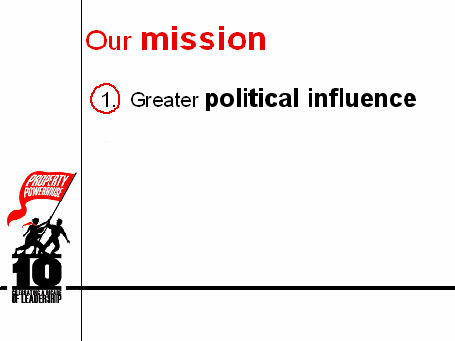
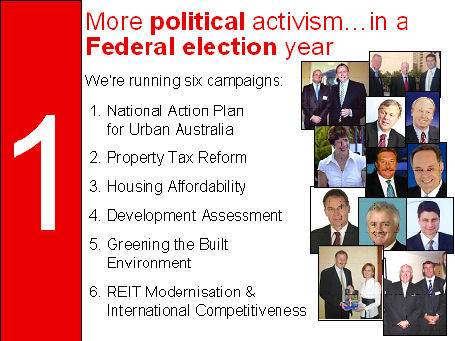
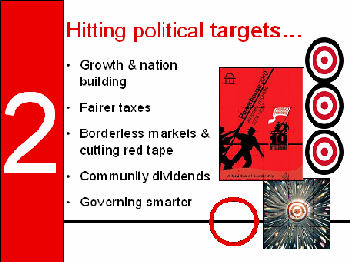
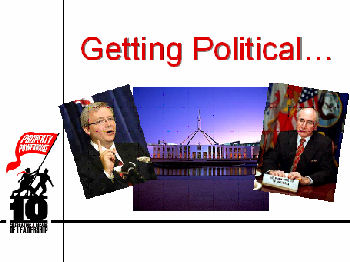

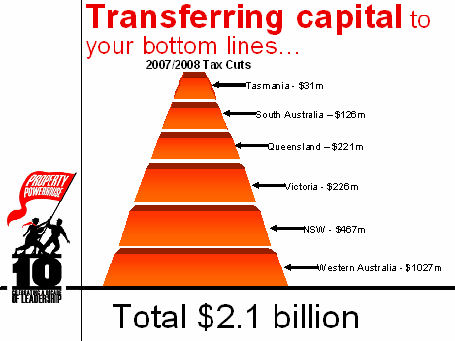
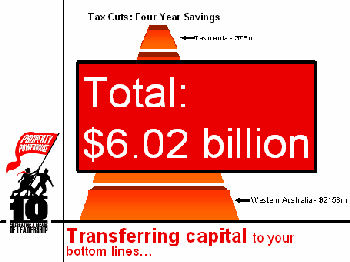



 One day it will dawn on us that this is no ordinary recession. This is not a fiscal or credit crisis. Another trough in the usual boom and bust cycle. This time Keynesian prime-pumping won't work (if in fact it ever did, contrary to legend). We cannot spend or inflate our way out of this one. And if we do the reverse, if we cut back spending and implement austerity and conservation measures, we will only be taking our foot off the gas pedal-----not braking our motion toward the cliff. And the poor and the unemployed will suffer a disproportionate amount of the pain. Traditional left wing or right wing strategies are obsolete. The problem they would attempt to solve is much deeper than they imagine, and beyond their comprehension.
One day it will dawn on us that this is no ordinary recession. This is not a fiscal or credit crisis. Another trough in the usual boom and bust cycle. This time Keynesian prime-pumping won't work (if in fact it ever did, contrary to legend). We cannot spend or inflate our way out of this one. And if we do the reverse, if we cut back spending and implement austerity and conservation measures, we will only be taking our foot off the gas pedal-----not braking our motion toward the cliff. And the poor and the unemployed will suffer a disproportionate amount of the pain. Traditional left wing or right wing strategies are obsolete. The problem they would attempt to solve is much deeper than they imagine, and beyond their comprehension.
 SELECTION CRITERIA: Members of the board must collectively possess the following required skills and/or experience: * business acumen, * public entity governance, * strategic planning, * conservation and land management, * community affairs, * knowledge of Indigenous issues, * tourism and recreation, * law, * academic research, * leadership experience. Parks Victoria have been very weak on fauna and hopeless on population policy, so consider applying and making a difference.
SELECTION CRITERIA: Members of the board must collectively possess the following required skills and/or experience: * business acumen, * public entity governance, * strategic planning, * conservation and land management, * community affairs, * knowledge of Indigenous issues, * tourism and recreation, * law, * academic research, * leadership experience. Parks Victoria have been very weak on fauna and hopeless on population policy, so consider applying and making a difference. "(There is) a fatal bias of the publishing world toward optimism. It is a bias that is commercially rewarding because it panders to our cultural and neurological need for false hope. The problem is, while optimism may be a good coping strategy on a personal level, it could be a calamitous approach for humanity to take on a collective level. If the crises we face are as challenging as the science indicates, we need first to fully understand how challenging they really are, as opposed to what we are comfortable with acknowledging. In other words, we need realism, not optimism. Before there can be a ‘call to action’, we have to understand the scope and nature of the problem we want to solve." Tim Murray
"(There is) a fatal bias of the publishing world toward optimism. It is a bias that is commercially rewarding because it panders to our cultural and neurological need for false hope. The problem is, while optimism may be a good coping strategy on a personal level, it could be a calamitous approach for humanity to take on a collective level. If the crises we face are as challenging as the science indicates, we need first to fully understand how challenging they really are, as opposed to what we are comfortable with acknowledging. In other words, we need realism, not optimism. Before there can be a ‘call to action’, we have to understand the scope and nature of the problem we want to solve." Tim Murray
 Tim Murray reports on a recent Canadian census and the public reaction in a voting poll to uncontrolled population growth. He asks why politicians seem to do the opposite of what the Canadian voters actually want.
Tim Murray reports on a recent Canadian census and the public reaction in a voting poll to uncontrolled population growth. He asks why politicians seem to do the opposite of what the Canadian voters actually want.
 We don't just need to separate religion from from government, we need to separate business from government. Only a very troubled democracy would have a mass media that actually dignified Australian banker, Elizabeth Proust's expectation that the people of Melbourne should simply walk away from the few remaining rights they have in their fractured, fragmented and amalgamated local councils. If this kind of thing goes ahead, our ability to self-govern will be unilaterally taken from us in order to ram through a Hong Kong style megacity that no doubt would benefit the banks. It has already happened in Brisbane where there is only one huge council - the same one that is responsible for so many new Brisbane homes being built on a flood plain that took lives, health and security in exchange for quick profits from bank-rolled property developers and government friends and clients.
We don't just need to separate religion from from government, we need to separate business from government. Only a very troubled democracy would have a mass media that actually dignified Australian banker, Elizabeth Proust's expectation that the people of Melbourne should simply walk away from the few remaining rights they have in their fractured, fragmented and amalgamated local councils. If this kind of thing goes ahead, our ability to self-govern will be unilaterally taken from us in order to ram through a Hong Kong style megacity that no doubt would benefit the banks. It has already happened in Brisbane where there is only one huge council - the same one that is responsible for so many new Brisbane homes being built on a flood plain that took lives, health and security in exchange for quick profits from bank-rolled property developers and government friends and clients.
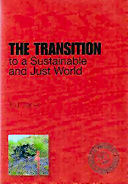
 "Oakeshott has been very vocal about the need to "challenge the power of money in politics" yet he seems to have been strongly influenced by the desperate native forest logging industry to support forest furnaces. We are very disappointed with his actions on this." (Prue Acton, Australian Forests and Climate Alliance.)
"Oakeshott has been very vocal about the need to "challenge the power of money in politics" yet he seems to have been strongly influenced by the desperate native forest logging industry to support forest furnaces. We are very disappointed with his actions on this." (Prue Acton, Australian Forests and Climate Alliance.)
 VicForests must this week pay Environment East Gippsland $630,000 in legal costs which it incurred defending its wrong action in planning to destroy wildlife habitat forest in Australia. This, and a pending case also mentioned in this article, is a welcome indication of independence in Victoria's judiciary, despite wide corruption of the democratic system in Victoria and the rest of Australia.
VicForests must this week pay Environment East Gippsland $630,000 in legal costs which it incurred defending its wrong action in planning to destroy wildlife habitat forest in Australia. This, and a pending case also mentioned in this article, is a welcome indication of independence in Victoria's judiciary, despite wide corruption of the democratic system in Victoria and the rest of Australia. The producers of Q and A have their favourites when it comes to “thinktanks”, with the free marketeering IPA topping the list with 4 different panellists and 11 appearances in total (not including appearances by former staff members). Meanwhile, prominent progressive think tank The Australia Institute has never featured on Q&A, despite TAI’s current head Dr Richard Denniss debating Lord Christopher Monckton about climate change at the National Press Club last year and its former head being prominent author and intellectual Professor Clive Hamilton.`````
The producers of Q and A have their favourites when it comes to “thinktanks”, with the free marketeering IPA topping the list with 4 different panellists and 11 appearances in total (not including appearances by former staff members). Meanwhile, prominent progressive think tank The Australia Institute has never featured on Q&A, despite TAI’s current head Dr Richard Denniss debating Lord Christopher Monckton about climate change at the National Press Club last year and its former head being prominent author and intellectual Professor Clive Hamilton.`````


 As a result of a peculiarity in the way Government works, the motion to call native forest furnace electricity ‘renewable energy’, has been sneakily placed on the 'non-controversial' list. That means that unless the Labor Government decides to force a vote, within days this back-door change in renewable energy policy could sneak through Parliament without there even being a vote!
As a result of a peculiarity in the way Government works, the motion to call native forest furnace electricity ‘renewable energy’, has been sneakily placed on the 'non-controversial' list. That means that unless the Labor Government decides to force a vote, within days this back-door change in renewable energy policy could sneak through Parliament without there even being a vote!
 Nicolas Sarkosi wants to reinforce European business, using the US example of giving public work to American companies. "Why should Europe forbid what America, the most economically liberal country in the world, permits itself? In this way European taxes would support European companies that have chosen to produce and manufacture in Europe." Sarkozi has also called for tighter immigration controls in Europe.
Nicolas Sarkosi wants to reinforce European business, using the US example of giving public work to American companies. "Why should Europe forbid what America, the most economically liberal country in the world, permits itself? In this way European taxes would support European companies that have chosen to produce and manufacture in Europe." Sarkozi has also called for tighter immigration controls in Europe.
 12 March 2012, Sydney: New research released today by the Stable Population Party has found 73% of Australians would prefer a stable population of around 26 million by 2050; instead of Australia's current rate of growth which will see us exceed 36 million by 2050.
12 March 2012, Sydney: New research released today by the Stable Population Party has found 73% of Australians would prefer a stable population of around 26 million by 2050; instead of Australia's current rate of growth which will see us exceed 36 million by 2050.
Recent comments